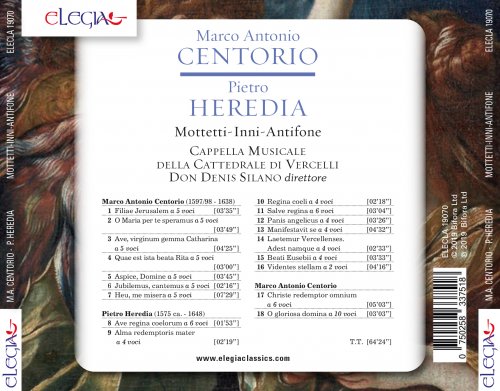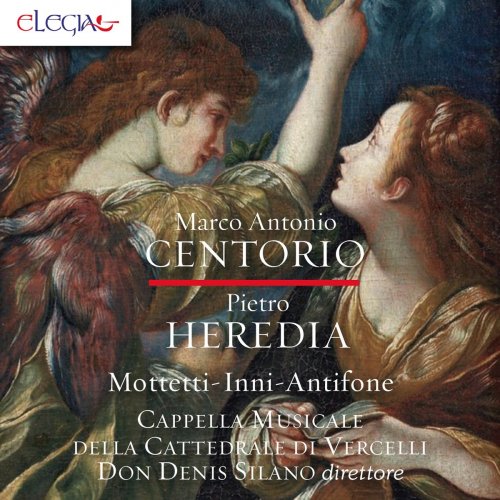
Don Denis Silano - Marco Antonio Centorio e Pietro Heredia: Mottetti - Inni - Antifone (2020)
BAND/ARTIST: Don Denis Silano
- Title: Marco Antonio Centorio e Pietro Heredia: Mottetti - Inni - Antifone
- Year Of Release: 2020
- Label: Elegia Classics
- Genre: Classical
- Quality: FLAC (tracks+booklet)
- Total Time: 64:17 min
- Total Size: 298 MB
- WebSite: Album Preview

Tracklist:
01. Filiae Jerusalem a 5 voci
02. O Maria per te speramus a 5 voci
03. Ave, virginum gemma Catharina a 5 voci
04. Quae est ista beata Rita a 5 voci
05. Aspice, Domine a 5 voci
06. Jubilemus, cantemus a 5 voci
07. Heu, me misera a 5 voci
08. Ave regina coelorum a 6 voci
09. Alma Redemptoris mater a 4 voci
10. Regina coeli a 4 voci
11. Salve Regina a 6 voci
12. Panis angelicus a 4 voci
13. Manifestavit se a 4 voci
14. Laetemur Vercellenses. Adest namque a 4 voci
15. Beati Eusebii a 4 voci
16. Videntes stellam a 2 voci
17. Christe Redemptor omnium a 6 voci
18. O gloriosa Domina a 10 voci
Among the Piedmontese ecclesiastical institutions that boast a highly respected liturgical-musical history, there is certainly the Cathedral of Vercelli, dedicated to St. Eusebio, the oldest episcopal seat in Piedmont. To it, since 1495, the Collegio degli Innocenti was joined, a place dedicated to the musical training of six pueri for the singing service of the Cathedral, although the little singers are witnessed at least since 1372. In the mid-sixteenth century the presence in the city of the ducal court of the Savoy family, together with the Holy Shroud, kept in the Cathedral from 1543 to 1561, allowed contact with the singers of what had once been the most prestigious musical chapel in Europe, some of whom, during their presence in the city, they offered their service to the Cathedral, even as teachers of the pueri. In the decades following the Council of Trent (1545 - 1563) and up to the long episcopate of Giacomo Goria (1611-1648), the Chair of Eusebius was occupied by important bishops who implemented the Council's dictates who, following the example of St. Charles Borromeo, they took particular care in choosing those who, as chapel masters, had to lead the musical reform along the lines of the new Roman rite, also introduced in Vercelli since 1575. Two of these masters from the first half of the seventeenth century, almost unknown to the modern public, deserve to be studied and re-evaluated: Pietro Heredia and Marco Antonio Centorio.
Year 2020 | Classical | FLAC / APE
As a ISRA.CLOUD's PREMIUM member you will have the following benefits:
- Unlimited high speed downloads
- Download directly without waiting time
- Unlimited parallel downloads
- Support for download accelerators
- No advertising
- Resume broken downloads


